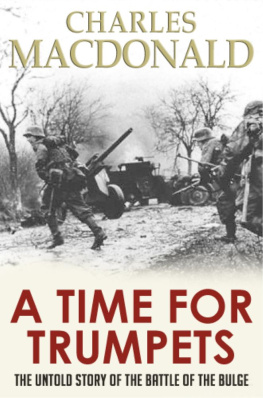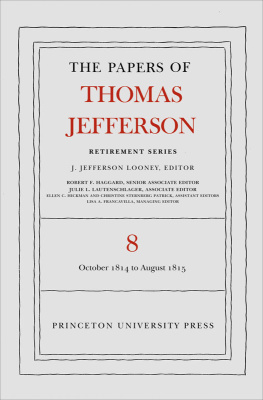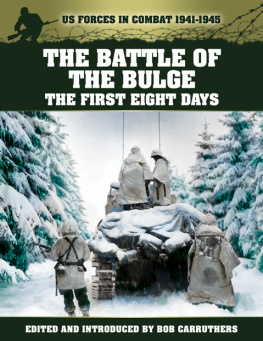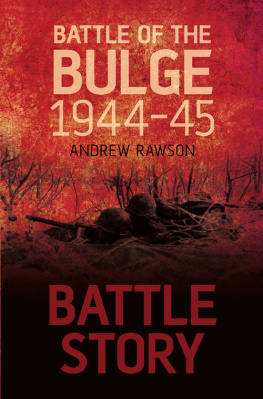The information in this book is true and complete to the best of the authors knowledge.
We recognize that some words, model names and designations, for example, mentioned herein are the
property of trademark holder. We use them for identification purposes only. This is not an official publication.
Victory WWII Publishing Ltd. books are also available at discounts in bulk quantity for industrial or sales promotional use.
For details write to Victory WWII Publishing Ltd, P.O. Box 670, Rogers, MN 55374-0670 USA.
Library of Congress Cataloging in Publication Data
Victory WW2 Publishing Inc. International Standard Book Number 0-9700567-4-5.
Author: Looney, George Micheal 1949
Title: The Battle of The Bulge:The Untold Story of Hfen
Printed in United States of America
Copyright 2009, Mike Looney. All rights reserve.
No part of this book may be reproduced in any form without prior written permission from the copyright owner.
Publisher: Tom Berndt
Design & Layout: Colleen K. Meyer
Proofing: D. Wicht
US Army Signal Corp Photographs supplied by author, historian and publisher, Tom Berndt
ISBN# 0-9700567-4-5
Distributed Exclusively Worldwide by: Victory WWII Publishing Ltd, P.O. Box 670, Rogers, MN 55374-0670 USA.
To order write to:
Victory WWII Publishing Ltd
P.O. Box 670
Rogers, MN 55374-0670
USA
FORWARD
The Trail of Captain George W. Looney
World War II was not only a chaotic affair, but truly a World War with fighting going on around the globe, on land, on sea and in the air with participants from virtually every country. Details of the war stretch to infinity and are impossible to grasp in total. To be understood at all, one must approach it in piecemeal fragments. One way is to study the history of an individual soldier and relate his actions to the whole.
George Washington Looney served as an artillery forward observer for the 196th Field Artillery Battallion, a vital, but relatively unfamiliar military assignment. George was a modest man who rarely spoke of his many accomplishments in the Army; Mike Looney has researched his Father's service history and wrote this book in an effort to properly recognize not only George's contributions to the Allied success during the war, but also the efforts of his fellow members of the 196th. Thor Ronningen, an infantryman at the battle of Hfen states the following;
I was an infantry rifleman in the little village of Hfen, Germany, when the German army attacked in overwhelming numbers on 16 December 1944the start of The Battle of The Bulge. The American front line was lightly manned and our artillery literally saved our lives as well as allowing us to hold our positions. At times, American artillery rounds would land within a few feet of our positions, decimating the attacking enemy, but not touching us. This was a textbook example of how artillery should defend against attack. George Looney was the forward observer directing these guns and assigning targets up and down our lines. He played it like a concert organist. I am here today because of his expertise.
On a summer day in 1990, I had the distinct and unforgettable pleasure of taking George W. Looney's photo in front of OP 6, his location on that December day that he saved my life. I feel fortunate to have shared that moment with him and to thank him for what he had done in '44. Men like him won WW II.
Thor Ronningen
We need a UN Resolution or something that says all combat soldiers in the future will be over forty-five years of age. No exceptions. Let the teenagers stay home and get rich making munitions. I dont know much, but I do know that would be the end of war for all time on this planet.
Robert Wyatt Thrasher, 395th Infantry Company, World War II

A fine photo of Mike Looneys father George and his mother Mary, standing in front of Mikes home in the early 1990s.
The Battle of The Bulge:
The Untold Story of Hfen
By Mike Looney

Table of Contents
Chapter One
GWL
George Washington Looney
George Washington Looney, I suppose, started to seriously strip off the layers of time during a Battle of the Bulge reunion trip in the fall of 1990. Seeing that three story building in Hfen, Germany for the first time since December of 1944, triggered an exchange of the bleacher seat in the back of his mind for a front row box seat.
Born February 22, 1918 in the hills of Charleston, Arkansas, George was fittingly named after our first president. A Texas Ranger baseball game in Arlington, Texas one hot summer night in 1996 served notice that more than one George Washington never told a lie. A six-car fender bender leaving the parking lot, kick started by me, rapidly brought two young petite, though tough talking, policewomen to the scene. While filing a report, one of the policewomen asked in a deathly tone if we were wearing seatbelts.
Yes, I heard myself reply with more respect than honesty.
My lying eyes immediately latched onto Georges and I read his look easier than a weekly reader. George, who wore a seatbelt as often as he fibbed, offered a hint of a grin that had nothing to do with smiling. I suppose I should say yes, but I cant truthfully say that I was wearing my seatbelt, he said, staring at little miss toughie through big brown eyes that had seen so much. Worry bled into the seriousness of his expression.
What did the policewoman see? A seventy-eight year old mellow grandfather, shoulders slightly stooped, his gray retreating hairline swept straight back and bushy white eyebrows annexing part of his high forehead? Or did she somehow know that she was looking at a potential poster boy for one of Brokaws books on the last great generation?
The more she struggled to hide her warm expression, the harder it fought for freedom. She lowered her pad without writing the ticket and simply said, You can go now.
George worried the entire trip home that the cop would send him a ticket. I should have known then that the world was slightly off its axis inside my fathers head.
I caught a glimpse that night of how blood coagulates thicker than reason. Though the accident was clearly the result of my rear-ending the car that continued the chain reaction, George decided a big trucker, about twenty vehicles ahead, caused it all by slamming on his brakes before leaving the access road for the interstate.
Later that summer, I visited my parents home, located less than two miles from my own residence. George had retired as head of the juvenile system of Dallas in 1980, previously serving as Dean of Men at a small college in Monticello, Arkansas after the war. In retirement, my old bedroom had become his hangout which was now a cross between a library and museum with mounds and stacks of pictures, books, mementos and handwritten notes on an old card table by his bed. Cardboard boxes filled with more of the same claimed most of the available floor space. Though the room was hardly an advertisement for tidy housekeeping, the sight did not strike me as overtly peculiar at the time.
After randomly selecting an off white worn paper from one stack, my eyes scanned the page. It was a citation for a Bronze Star awarded to George for his actions in World War II on the night of December 3rd,1944, in the Hrtgen Forest, a 50 square mile area of dense trees and hilly topography located in southern Germany along the Belgium border. While dealing with one of the most miserable winters in Europes history, the Hrtgen fight raged from mid-September to mid-December, devouring its dead with a torrid vengeance as the Americans suffered over 33,000 casualties! With Georges infantry company encircled by the Germans, George, an artillery observer for the 196th Field Artillery Battalion, directed artillery fire for three days and nights under heavy enemy fire. After finally being relieved, he started for the rear to join his Battalion Command Post. It seems George soon found himself lost behind enemy lines and stumbled across ten wounded GIs who were also lost, including one in no condition to walk. Another lieutenant asked if Lt. Looney would assume command and lead them from harms way. Im sure George shrugged and said he would try his best and off they went with my dad carrying the wounded GI on his back. Somehow my old manhe was 26 and older than many GIsnavigated them through darkness, sniper fire and land mines to safety. I learned 55 years later from his radio operator that he never saw the Lt. lost during the war.













